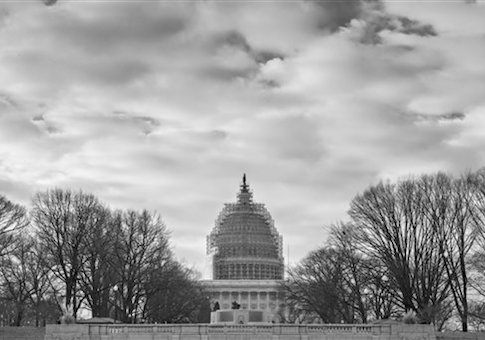Results 1 to 1 of 1
Thread Information
Users Browsing this Thread
There are currently 1 users browsing this thread. (0 members and 1 guests)
-
02-15-2015, 11:55 AM #1
Farewell Federal Grants—and Good Riddance!
Farewell Federal Grants—and Good Riddance!
Review: James L. Buckley’s ‘Saving Congress from Itself’
 APBY: Daniel Bassali
APBY: Daniel Bassali
February 15, 2015 5:00 am
Say goodbye to those education Pell Grants and to that HUD Home Investment Partnership Program you have heard so many nice things about. In fact, if former senator and federal judge James L. Buckley has his way, every government program that relies on federal grants to state and local governments will be done for.
The idea is not as preposterous as it may at first sound, even if it is untenable in the manner Buckley proposes. In Saving Congress from Itself: Emancipating The States & Empowering Their People, Buckley’s manifesto to restore a more strict interpretation of the 10th Amendment, the central premise is that the grants themselves may be well intentioned and at times effective, but the system through which they are implemented is riddled with inefficiency.
Instead of sending a dollar to go to D.C. so that a “distant bureaucracy” eats up 20 cents then spits it back with a book full of regulations, would it not make more sense just to keep that dollar where it is for the discretion of local priorities? Buckley claims these grants also distract from Congress’ “core national responsibilities.” Instead of focusing on issues of national defense, congressmen are squabbling over which district will get the funds to widen its sidewalks.
Two Supreme Court cases—Steward Machine Co v. Davis and South Dakota v. Dole—allowed Congress to provide states with funds to implement programs over which Congress had no authority and empowered Congress to “induce” states to adopt programs it constitutionally could not impose. Buckley believes these rulings by the Court allowed Congress to bribe the states, diminishing local responsibility over local matters.
Congress, which has the power of the purse, pits states against one another for what is perceived to be “free money.” However, a number of studies highlighted in Saving Congress from Itself show that the unfunded mandates included in grants cost local governments hundreds of millions of dollars. Federal grants now make up a quarter of states’ budgets but add to deficits, because states take on projects carrying unfunded requirements.
Why do the states do this? They know that if they do not play ball, the money will be spent on the same project in another state. Congress has blurred the lines of where its responsibilities end and local governments’ begin.
The system benefits three groups of people: Congressmen who “bring home the bacon” with grants that secure their reelection, bureaucrats whose livelihood exists to ensure that regulations are enforced, and lobbyists who are hired to acquire “free money” for their clients. The biggest loser is the American taxpayer. Local citizens lose any voice over projects that impact their lives most. Buckley is quick to point out that the beneficiaries of the system are not inherently bad people. “My problem is with the game itself.”
Buckley notes that Congress has fallen in love with this game. In 1960 only 132 grants existed accounting for 7.6 percent of the total federal budget, but by 1970 Congress handed out 530 grants. This year there are well over 1,100 grants costing $640.8 billion dollars—a sixth of all government spending.
Buckley argues that federal grants have very real consequences, and his negative case against the existing system deserves attention.
But Buckley’s “modest proposal” for reform is incomplete: he proposes to terminate all grants by offering each state a single no-strings-attached block grant phased out over five years. That is it.
Buckley does not address the potential economic consequences of his proposed transition, which is ideologically attractive but uninspiring from the point of view of practicality. Buckley underestimates the complexity of reforming the tax code and doesn’t mention the ways in which entitlement delivery will be radically affected.
There is no plan, either, for the politics of passing such a reform. Buckley proposes a grassroots effort, the thought being that people will support the proposal once they learn of the inefficiencies of grants. But it is unclear the level of detail to which the American taxpayer seeks to understand how his sidewalk got paid for, so long as it is there. Outside of Washington, D.C., Americans have lives.
Simply suggesting to do away with a sixth of government spending is not a cure, even if Buckley’s diagnosis of a disease is compelling—so much so that Scott Walker clearly indicated that he appreciates Buckley’s argument. Perhaps the governor of Wisconsin can finish what Buckley begins.
http://freebeacon.com/culture/farewe...good-riddance/
Similar Threads
-
Good Riddance to the Devil's Decade
By carolinamtnwoman in forum Other Topics News and IssuesReplies: 0Last Post: 12-29-2009, 11:21 AM -
Good riddance GOP Sen. Mel Martinez Is Resigning
By dman1200 in forum illegal immigration News Stories & ReportsReplies: 2Last Post: 08-07-2009, 08:42 PM -
GOOD-BYE AND GOOD RIDDANCE MR. BUSH
By Jean in forum illegal immigration News Stories & ReportsReplies: 5Last Post: 11-17-2008, 11:44 PM -
Good riddance to day-labor sites
By Brian503a in forum illegal immigration News Stories & ReportsReplies: 0Last Post: 04-27-2006, 08:38 PM -
Good-Bye and Good Riddance to Vicente Fox
By Brian503a in forum illegal immigration News Stories & ReportsReplies: 0Last Post: 11-26-2005, 06:35 PM


 LinkBack URL
LinkBack URL About LinkBacks
About LinkBacks




 Reply With Quote
Reply With Quote


AFRICAN MIGRANTS COMPLAIN AT NYC TOWN HALL OVER FREE FOOD AND...
04-17-2024, 11:49 PM in Videos about Illegal Immigration, refugee programs, globalism, & socialism